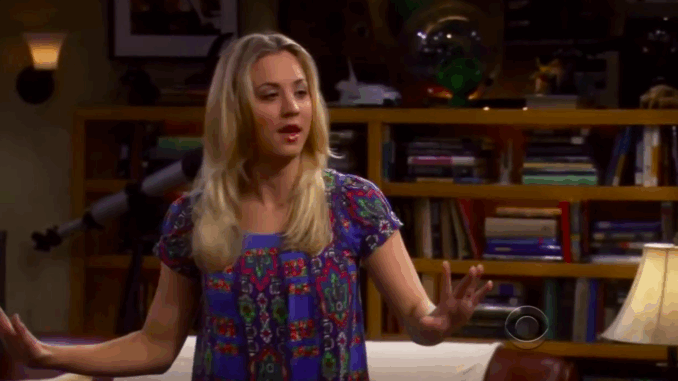
At first glance, Penny was the archetype sitcom viewers had seen a hundred times: the pretty blonde girl next door with dreams of stardom. But The Big Bang Theory did something surprising with her. Instead of confining her to the margins of the geek world, the show gradually positioned Penny as its emotional heart—and one of its most grounded characters.
The Original Outsider
When Penny (played by Kaley Cuoco) first moved in across the hall from Leonard and Sheldon, she was clearly from a different universe. While the guys spoke Klingon and solved theoretical equations, Penny talked about auditions, ex-boyfriends, and Cheesecake Factory drama. In the early episodes, much of the humor came from the contrast between her “normalcy” and their nerdiness.
But the writers resisted making her a simple stereotype. Penny wasn’t just a pretty face—she had grit, ambition, and deep emotional intelligence. Over time, the audience saw her not as an outsider looking in, but as a bridge connecting two worlds.
A Different Kind of Intelligence
Penny didn’t have a degree, and she often admitted she didn’t fully understand what her friends did for a living. But that didn’t make her any less intelligent. She read people better than anyone else on the show. She could spot emotional shifts, de-escalate awkward moments, and stand up for herself with razor-sharp wit.
This emotional savvy became a critical counterweight to Sheldon’s robotic logic and Leonard’s intellectual insecurity. While the scientists explained the cosmos, Penny understood people. She helped the group navigate life in ways no equation could solve.
A Love Story That Grew With Her
Penny and Leonard’s romance was central to the show’s arc. What made their relationship compelling wasn’t just the opposites-attract trope—it was how both characters changed each other for the better.
Leonard gave Penny stability and encouraged her to believe in herself. Penny grounded Leonard, challenged his insecurities, and introduced him to a world outside the lab.
Their love story didn’t follow the traditional path. They broke up. They grew. They fought. They married. And unlike many sitcom couples, they didn’t magically become perfect. Their evolution felt real—messy, uncertain, but ultimately committed.
Rejecting the Dream, Embracing Her Truth
One of the most revolutionary aspects of Penny’s journey was the way she gradually let go of her dream of becoming an actress. In another show, this might’ve been portrayed as failure. But The Big Bang Theory flipped that narrative.
Instead of acting, Penny found fulfillment in pharmaceutical sales—a career she was good at, even if it wasn’t what she’d once imagined. The message was subtle but powerful: success doesn’t have to look like fame. It can look like confidence, competence, and stability.
And in a show filled with characters chasing grand, abstract goals, Penny’s arc was grounded in something refreshingly real—finding her own path, on her own terms.
Penny and the Women of TBBT

As Amy and Bernadette became regulars, Penny also evolved as a friend. The trio’s dynamic was rich, funny, and at times surprisingly deep. Penny went from dismissing science to celebrating her friends’ achievements. She embraced their quirks without losing her own identity.
Her friendship with Amy, in particular, was a standout. What began as reluctant tolerance turned into genuine affection. Penny became a sister figure to Amy—someone who helped her navigate social life, relationships, and even fashion.
Their bond defied expectations and brought a much-needed female perspective to a male-heavy show.
A New Kind of Sitcom Woman
In many ways, Penny’s character defied the rules. She wasn’t defined by her job, or her boyfriend, or even her appearance. She changed careers, re-evaluated motherhood, and remained true to herself. She didn’t always know what she wanted, but she kept moving forward—a relatable, human response to growing up.
Kaley Cuoco’s performance gave Penny depth, warmth, and a fierce sense of humor. She could carry a punchline or a quiet emotional scene with equal strength.
And in the end, Penny wasn’t just the girl next door—she was the woman who held the group together.